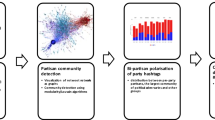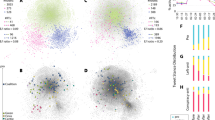Abstract
Twitter influences political debates. Phenomena like fake news and hate speech show that political discourses on social platforms can become strongly polarised by algorithmic enforcement of selective perception. Some political actors actively employ strategies to facilitate polarisation on Twitter, as past contributions show, via strategies of ‘hashjacking’(The use of someone else’s hashtag in order to promote one’s own social media agenda.). For the example of COVID-19 related hashtags and their retweet networks, we examine the case of partisan accounts of the German far-right party Alternative für Deutschland (AfD) and their potential use of ‘hashjacking’ in May 2020. Our findings indicate that polarisation of political party hashtags has not changed significantly in the last two years. We see that right-wing partisans are actively and effectively polarising the discourse by ‘hashjacking’ COVID-19 related hashtags, like #CoronaVirusDE or #FlattenTheCurve. This polarisation strategy is dominated by the activity of a limited set of heavy users. The results underline the necessity to understand the dynamics of discourse polarisation, as an active political communication strategy of the far-right, by only a handful of very active accounts.
Access this chapter
Tax calculation will be finalised at checkout
Purchases are for personal use only
Similar content being viewed by others
References
Gillespie, T.: Custodians of the Internet. Yale University Press (2018)
Engesser, S., Ernst, N., Esser, F., Büchel, F.: Populism and social media: how politicians spread a fragmented ideology. Inf. Commun. Soc. 20(8), 1109–1126 (2017)
Mudde, C.: The populist zeitgeist. Govern. Opposition 39(4), 541–563 (2004)
Stier, S., Posch, L., Bleier, A., Strohmaier, M.: When populists become popular: comparing Facebook use by the right-wing movement Pegida and German political parties. Inf. Commun. Soc. 20(9), 1365–1388 (2017)
Krämer, B.: Populist online practices: the function of the Internet in right-wing populism. Inf. Commun. Soc. 20(9), 1293–1309 (2017)
Frye, C.E.: Carl Schmitt’s concept of the political. J. Politics 28(4), 818–830 (1966)
Mouffe, C.: Carl Schmitt and the paradox of liberal democracy. Can. J. Law Jurisprud. 10(1), 21–33 (1997)
Conover, M.D., Ratkiewicz, J., Francisco, M., Gonçalves, B., Menczer, F., Flammini, A.: Political polarization on Twitter. In: Fifth International AAAI Conference on Weblogs and Social Media (2011)
Conover, M.D., Gonçalves, B., Flammini, A., Menczer, F.: Partisan asymmetries in online political activity. EPJ Data Sci. 1(1), 1–19 (2012). https://doi.org/10.1140/epjds6
Mirer, M.L., Bode, L.: Tweeting in defeat: how candidates concede and claim victory in 140 characters. New Media Soc. 17(3), 453–469 (2015)
Hadgu, A.T., Garimella, K., Weber, I.: Political hashtag hijacking in the US. In Proceedings of the 22nd International Conference on World Wide Web, pp. 55–56, May 2013
VanDam, C., Tan, P.N.: Detecting hashtag hijacking from Twitter. In Proceedings of the 8th ACM Conference on Web Science, pp. 370–371, May 2016
Knüpfer, C., Hoffmann, M., Voskresenskii, V.: Hijacking MeToo: transnational dynamics and networked frame contestation on the far right in the case of the ‘120 decibels’ campaign. Inf. Commun. Soc. 1-19 (2020)
Darius, P., Stephany, F.: “Hashjacking” the debate: polarisation strategies of Germany’s political far-right on Twitter. In: Weber, I., et al. (eds.) Social Informatics. SocInfo 2019. LNCS, vol. 11864, pp. 298–308. Springer, Cham (2019). https://doi.org/10.1007/978-3-030-34971-4_21
Bruns, A., Burgess, J.: The use of Twitter hashtags in the formation of ad hoc publics. In: Proceedings of the 6th European Consortium for Political Research (ECPR) General Conference 2011, pp. 1–9. The European Consortium for Political Research (ECPR) (2011)
Bruns, A., Moon, B., Paul, A., Münch, F.: Towards a typology of hashtag publics: a large-scale comparative study of user engagement across trending topics. Commun. Res. Pract. 2(1), 20–46 (2016)
Pond, P., Lewis, J.: Riots and Twitter: connective politics, social media and framing discourses in the digital public sphere. Inf. Commun. Soc. 22(2), 213–231 (2019)
Xu, W.W.: Mapping connective actions in the global alt-right and Antifa counterpublics. Int. J. Commun. 14, 22 (2020)
Jacomy, M., Venturini, T., Heymann, S., Bastian, M.: ForceAtlas2, a continuous graph layout algorithm for handy network visualization designed for the Gephi software. PloS One 9(6), e98679 (2014)
Blondel, V.D., Guillaume, J.L., Lambiotte, R., Lefebvre, E.: Fast unfolding of communities in large networks. J. Stat. Mech.: Theory Exp. 2008(10), P10008 (2008)
Neuendorf, K.A.: The Content Analysis Guidebook. Sage (2017)
De Meo, P., Ferrara, E., Fiumara, G., Provetti, A.: Generalized Louvain method for community detection in large networks. In: 2011 11th International Conference on Intelligent Systems Design and Applications, pp. 88–93. IEEE, November 2011
Author information
Authors and Affiliations
Corresponding author
Editor information
Editors and Affiliations
7 Appendix
7 Appendix
The retweet network of #AfD from May 2020 shows a clear bimodal clustering of accounts. Accounts in the left (red) cluster are assigned as AfD partisans. The party’s official account (@AfD), the AfD parliamentary account (@AfDimBundestag), and the account of the parliamentary leader (@Alice_Weidel) are highlighted in yellow.
Rights and permissions
Copyright information
© 2022 The Author(s), under exclusive license to Springer Nature Switzerland AG
About this paper
Cite this paper
Darius, P., Stephany, F. (2022). How the Far-Right Polarises Twitter: ‘Hashjacking’ as a Disinformation Strategy in Times of COVID-19. In: Benito, R.M., Cherifi, C., Cherifi, H., Moro, E., Rocha, L.M., Sales-Pardo, M. (eds) Complex Networks & Their Applications X. COMPLEX NETWORKS 2021. Studies in Computational Intelligence, vol 1073. Springer, Cham. https://doi.org/10.1007/978-3-030-93413-2_9
Download citation
DOI: https://doi.org/10.1007/978-3-030-93413-2_9
Published:
Publisher Name: Springer, Cham
Print ISBN: 978-3-030-93412-5
Online ISBN: 978-3-030-93413-2
eBook Packages: EngineeringEngineering (R0)





